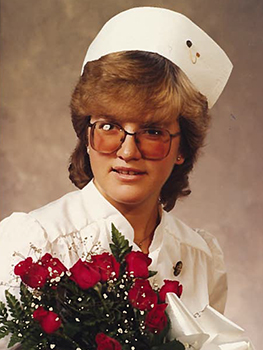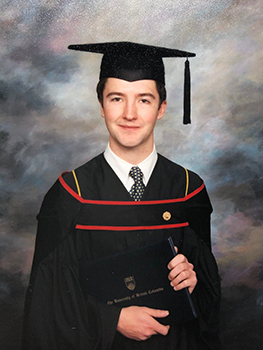Happy National Nursing Week (May 10-16) and International Nurses’ Day (May 12)! The theme for Nursing Week in 2021 is #WeAnswerTheCall. To celebrate, we interviewed our three Chief Operating Officers, who are all nurses, and asked them about ‘answering the call.’
What does “we answer the call” mean to you?
Penny Anguish, Northern Interior Chief Operating Officer:
Those that go into nursing are people who care for, or have a predisposition for caring for others, and with that comes a sense of obligation which may include putting others’ needs before your own. There’s a sense of selflessness when there’s a need to respond to a situation. Answering the call means working shift work, possibly working through breaks, or working overtime when there are patients in need. Nurses have a deep sense of obligation to care for individuals and answering the call is the need to respond to that obligation.
Answering the call can also be seen in everyday work. It can be working in community nursing and going the extra mile to sort out a problem for an individual in their home, or in the hospital and working outside what is typically routine to meet an important patient need.
We continuously see nurses answer the call in urgent situations and times of crisis, such as the 2017 wildfires when people from care homes and other health care settings in Williams Lake were relocated to Prince George. People who had a background in nursing stepped up to work alongside our nursing staff outside their regular jobs, on weekends and extended hours to provide the care and support so many people needed during that very challenging time.
Angela De Smit, Northeast Chief Operating Officer:

Coming from a leadership perspective, answering the call means that as a nurse and as a leader, I need to recognize the time that we're in with the pandemic. Throughout the pandemic, answering the call meant to me making sure that everyone from front line nurses, to support services, to physicians, were kept up-to-date with the most current information we had at the time to decrease the anxiety associated with the uncertainty. Answering the call meant to stand up as a leader, hear from everyone, and disseminate the relevant information in a timely manner so we can provide safe and quality care and dissipate anxiety.
Ciro Panessa, Northwest Chief Operating Officer:
To me, answering the call as a nurse means a sense of duty and service. The reason I became a nurse was because I wanted to help people, to help society, and do something that felt tangibly worthwhile and to make a difference for people. For me, being a nurse came from that sense of having a deep desire to want to leave the world a better place and wanting to help people in need.
A lot of nurses (including myself) have had negative events happen in their lives and going into nursing was about turning that event into a positive. Nursing was a deliberate attempt and dedication to taking negatives from early on in my life and turning them around into a positive so other people can have a positive experience.
How have you seen nurses answer the call during the COVID-19 pandemic?
Penny:
We have seen nurses demonstrate how they answer the call in many areas, but particularly in critical care. There is a significant provincial shortage of specialized nurses in critical care and there has been a large amount of pressure on that area throughout the pandemic. Our critical care areas have seen sustained high volumes of patients throughout COVID-19, with nursing vacancies and many very complex patients adding to their workload – this has been extraordinarily challenging for those nurses each and every shift.
Nurses in every area of care had to adjust to the potential of having COVID-19 positive patients; this meant changes to their work routines and how they perform their duties, and taking on worries about putting their families at risk.
I think the nurses working in the medically stable infectious diseases units are our unsung heroes – they are not specialty trained nurses, but have stepped up when their unit was transformed into an infectious diseases unit and have shifted and adjusted the unit to care for this group of patients. Their work along with their leader to serve the population in need demonstrates how they have been quietly amazing and an inspiration to all of us.
Lastly, community nurses have been remarkable through this entire pandemic. From organizing COVID-19 testing sites, to ensuring homebound people are vaccinated, and setting up mass vaccine clinics that are running with beautiful efficiency, they continue to provide a professional and caring experience for those getting a vaccine.
Angela:
We have seen nurses answer the call throughout the pandemic in every way possible - from all levels of nursing and throughout the health care system. Nurses have been coming in for extra shifts and supporting each other as a nursing family while continuing to show empathy and provide support to families and their loved ones.
Nurses have been there for their patients when their families were unable, due to visiting restrictions, and were there for the families to talk to when they couldn't visit. During facility outbreaks, the need for communication with families and patients was intensified, and nurses were there to reassure families and patients and provide them with information during the uncertainty.
The atmosphere at our facilities during outbreaks is inspiring, people coming from all across Northern Health to help with staffing support and to care for the residents. Many nurses state they feel like they’re all part of a family – everyone helping when we're feeling overwhelmed to bring together ideas and support each other.
Ciro:

Nurses have immense courage to be at the front lines when facing a great unknown, such as the COVID-19 pandemic, and to care for people when we didn't know a lot about the virus. Nurses have demonstrated exceptional care during a time of uncertainty, but they were still there caring for their patients and not abandoning them in their time of need.
Throughout the pandemic, nurses have had to continue to learn to do COVID-19 testing, swabbing, hospital care, emergency/outbreak responses, while supporting patients and families with visiting restrictions, and providing communication and connection between people who are sick and their families, all of which takes a lot of extra effort.
We have had nurses volunteer to work in the infectious disease unit areas and with those who are COVID-19 positive in the hospital and long-term care, and it takes courage to do that, especially when we were in a period with no vaccines. Now, we have the vaccine program running and we see nurses are stepping up again as we try to get up to 80% vaccine coverage.
What message about answering the call, or about nursing in general, would you like to share with other nurses?
Penny:
I just want to recognize how much people have personally given during the COVID-19 response. Managing the fluctuating system needs and patient surges while dealing with all the personal impacts of living through a pandemic deserves recognition.
We know that nurses are exhausted and are having to reach deep right now to get through another day or another shift, and this does not go unnoticed. This pandemic has been exceptionally challenging for individuals, but there's hope and optimism to carry us through this last stretch.
Angela:
The key thing is we see you, we value you, and we will continue to work to support you. We advocate for your needs and access to providing safe care. I want to thank nurses for their commitment, their sense of community, and for the services they're providing to support individuals where they’re at – in a long-term care facility, in the community, or the hospital. I’m very proud to be part of the organization and lead a team who's so committed and willing to answer the call.
Ciro:
I have a deep appreciation for nurses who have come to answer the call and continue to do so during such an extraordinary time. Nursing is a very challenging and rewarding job and it’s difficult enough to do when not in a pandemic. It has been much more intense in the face of two public health emergencies, and I am very appreciative people are answering the call when we need it the most.














Comments